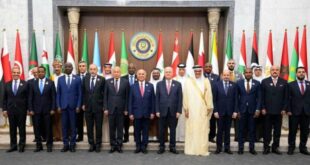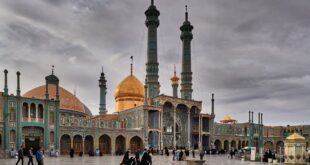JERUSALEM – Israeli and Palestinian negotiators struggled on Monday to get U.S.-sponsored peace talks, stalled by disputes over Jewish settlements, on course before a visit by President George W. Bush.
Talks between the lead negotiators — Israeli Foreign Minister Tzipi Livni and former Palestinian Prime Minister Ahmed Qurie — ended without announcement of an expected agreement on working groups that would begin to tackle some of the thorniest issues in the conflict.
“Tomorrow there will be another meeting … to continue these discussions,” said Livni’s spokesman, Arye Mekel.
Israeli Prime Minister Ehud Olmert and Palestinian President Mahmoud Abbas will be joined by their negotiators at the meeting, one day before Bush begins his first presidential visit to Israel and the occupied West Bank on Wednesday.
Abbas aide Saeb Erekat confirmed the meeting.
Six weeks after the talks were launched at a peace conference in Annapolis, Maryland, the impasse over even setting up the working groups underscored the mammoth hurdles facing Bush’s goal of trying to close a statehood deal within 12 months.
It is unclear how three weakened leaders hope to close the gaps over borders, and the fate of Jerusalem and Palestinian refugees in the limited time that remains in Bush’s term.
Abbas wields little authority beyond the Israeli-occupied West Bank after Hamas Islamists seized control of the Gaza Strip in June. Israel has stepped up attacks in Gaza in recent weeks against militants who fire cross-border rockets.
Olmert was weakened by the 2006 war in Lebanon and could face new calls to resign at the end of the month when a commission of inquiry issues its final report on Israel’s deficiencies in the conflict with Hezbollah guerrillas.
Bush has only a year left in office and doubts remain over his readiness to push both sides to make difficult compromises.
SETTLEMENT ISSUE
Speaking in the West Bank town of Bethlehem earlier on Monday, Abbas said he would ask Bush to halt Jewish settlement activity for the sake of peace.
Bush has called settlement expansion on occupied land where Palestinians seek statehood an “impediment” and said he would raise the issue with Olmert.
Erekat said Qurie told Livni during Monday’s meeting that “continuing settlement activity and military incursions in the West Bank and Gaza … are undermining our efforts to begin negotiations on final status issues”.
Olmert last week ordered a de-facto halt to new Israeli projects in the West Bank, but has not called off plans to build hundreds of new homes in an area near Jerusalem known to Israelis as Har Homa and to Palestinians as Jabal Abu Ghneim.
Construction there has been the main source of disagreement with the Palestinians and has drawn fire from Washington.
Olmert has conditioned implementing any peace deal with the Palestinians on Abbas first proving his mettle against militants. While Abbas had made some progress on security, Israel said the Palestinians still had a way to go.
Under the plan for negotiations under discussion, Livni and Qurie, backed by teams of experts, would conduct the main final-status negotiations, largely in secret.
Working groups will tackle specific issues, such as water or economic cooperation. Olmert and Abbas would intervene to settle disputes between the teams when they arise, officials said.
 Eurasia Press & News
Eurasia Press & News



